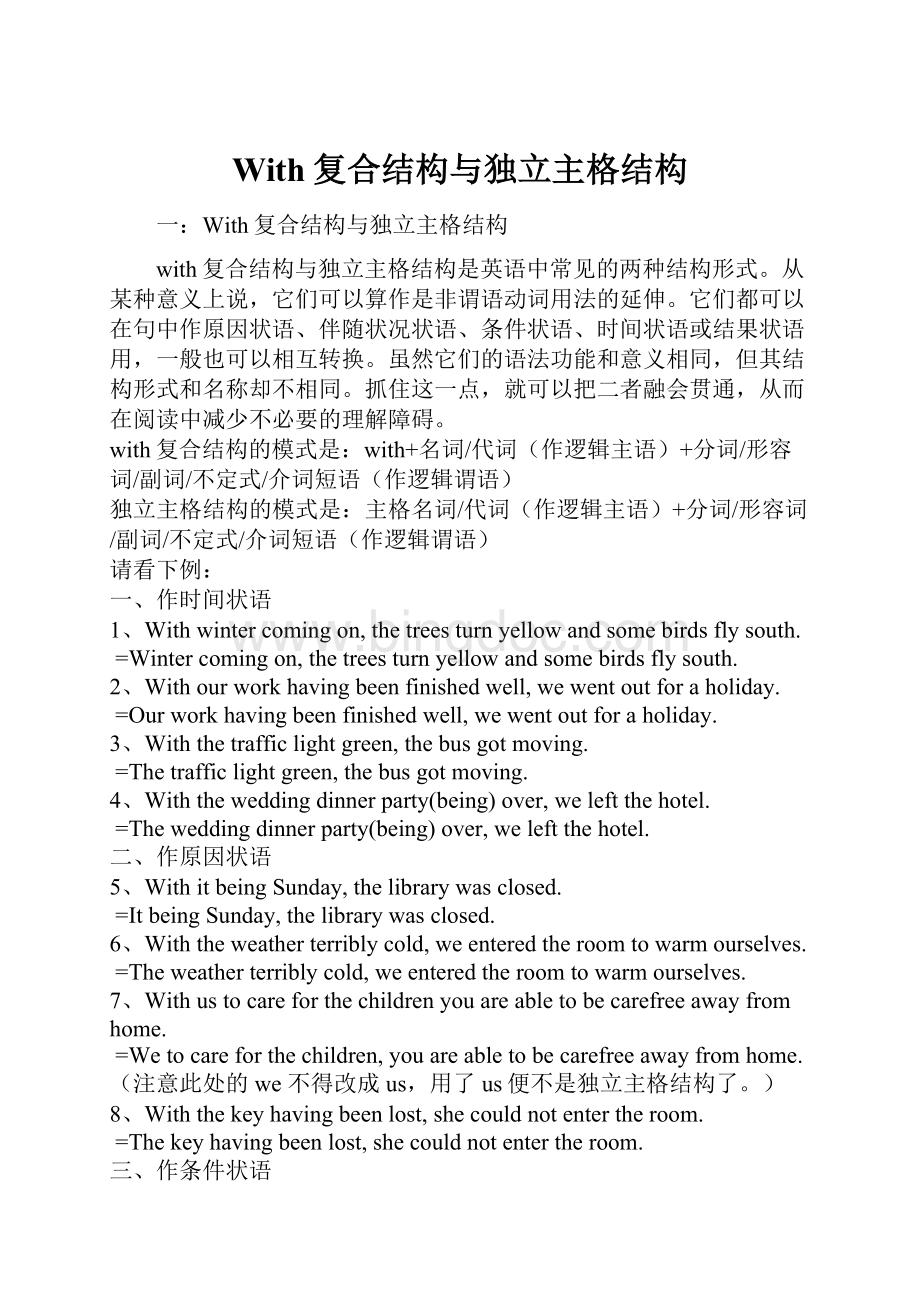With复合结构与独立主格结构.docx
《With复合结构与独立主格结构.docx》由会员分享,可在线阅读,更多相关《With复合结构与独立主格结构.docx(10页珍藏版)》请在冰点文库上搜索。

With复合结构与独立主格结构
一:
With复合结构与独立主格结构
with复合结构与独立主格结构是英语中常见的两种结构形式。
从某种意义上说,它们可以算作是非谓语动词用法的延伸。
它们都可以在句中作原因状语、伴随状况状语、条件状语、时间状语或结果状语用,一般也可以相互转换。
虽然它们的语法功能和意义相同,但其结构形式和名称却不相同。
抓住这一点,就可以把二者融会贯通,从而在阅读中减少不必要的理解障碍。
with复合结构的模式是:
with+名词/代词(作逻辑主语)+分词/形容词/副词/不定式/介词短语(作逻辑谓语)
独立主格结构的模式是:
主格名词/代词(作逻辑主语)+分词/形容词/副词/不定式/介词短语(作逻辑谓语)
请看下例:
一、作时间状语
1、Withwintercomingon,thetreesturnyellowandsomebirdsflysouth.
=Wintercomingon,thetreesturnyellowandsomebirdsflysouth.
2、Withourworkhavingbeenfinishedwell,wewentoutforaholiday.
=Ourworkhavingbeenfinishedwell,wewentoutforaholiday.
3、Withthetrafficlightgreen,thebusgotmoving.
=Thetrafficlightgreen,thebusgotmoving.
4、Withtheweddingdinnerparty(being)over,weleftthehotel.
=Theweddingdinnerparty(being)over,weleftthehotel.
二、作原因状语
5、WithitbeingSunday,thelibrarywasclosed.
=ItbeingSunday,thelibrarywasclosed.
6、Withtheweatherterriblycold,weenteredtheroomtowarmourselves.
=Theweatherterriblycold,weenteredtheroomtowarmourselves.
7、Withustocareforthechildrenyouareabletobecarefreeawayfromhome.
=Wetocareforthechildren,youareabletobecarefreeawayfromhome.(注意此处的we不得改成us,用了us便不是独立主格结构了。
)
8、Withthekeyhavingbeenlost,shecouldnotentertheroom.
=Thekeyhavingbeenlost,shecouldnotentertheroom.
三、作条件状语
1、Withtimepermitting(许可),we’llvisittheSummerPalace.
=Timepermitting,we’llvisittheSummerPalace.
2、Withthecargoingwrong,we’llhavetostopatthefootofthemountain.
=Thecargoingwrong,we’llhavetostopatthefootofthemountain.
四、作伴随状况状语
1、Themotherwascleaningthehousewithherbabyplayingonthebed.
=Themotherwascleaningthehouse,herbabyplayingonthebed.
2、Heworeashirtwiththeneckopen.
=Heworeashirt,theneckopen.
3、LastnightIfollowedhim,andclimbedin,withaswordinmyhand.
=LastnightIfollowedhimandclimbedin,swordinhand.
4、Hesattherethinking,withhisheadonhishand.
=Hesattherethinking,headonhand.
注意:
若with复合结构在句中作伴随状况状语,且结构模式又是“with+名词+介词短语”,那么with复合结构转换成独立主格结构时,介词前后的两个名词就应该用单数形式且不带包括冠词在内的任何限定词。
上述句3、句4便是例证。
无论with复合结构还是独立主格结构,都不可有动词的谓语形式充当其中的逻辑谓语。
如下例中的was就必须去掉:
Hesatatthedeskreadingwithapenwasinhisrighthand.
这两种结构在句中作时间、条件或原因状语时,分别与表示时间、条件或原因的状语从句同义。
例如:
Timepermitting;wewillvisittheYellowMountain.=IftimepermitswewillvisittheYellowMountain.
ItbeingSunday,peoplegotuplatethatday.=AsitwasSundaypeoplegotuplatethatday.
Themeetingover,weallwenthome.=Whenthemeetingwasoverweallwenthome.
with复合结构可以作后置定语修饰名词,而独立主格结构则不可作后置定语修饰名词。
例如:
Soonshearrivedataparkwithgrassgreenandflowersinblossom.
=Soonshearrivedataparkwhosegrasswasgreenandwhoseflowerswereinblossom.
有趣的是,这两种结构可以结合起来合适,并表现出独立主格的特色来。
例如:
Inthepark,thetouristsareenjoyingdifferentkindsoftrees,somewithasinglebranchgrowingashighas15meters.(游客们在公园里观赏各种树木,有些树的单枝就高达15米。
)句中“some+with…”是独立主格结构,而with后面又带有自己的复合结构。
Theboysareplayingwithsnow,eachwithafaceredwithcold.(孩子们在打雪仗,个个脸蛋都冻得通红。
)在句中,“each+with…”是独立主格结构,而with后面又带有自己的复合结构。
切记,后面能带复合结构的介词只有with,without和like。
这样用的without和like可见于下例中:
Themanwhosavedthemoneydiedwithoutanyoneknowingwherethecoinswerehidden.
Ananimalhavingblackstripes(斑纹)liketheChinesecharacter“王”shownontheforehead(前额)mustbetiger.
Thepinetreestillstoodtherelikeanumbrellacoveringtheentrancetothevalley.
2、让步状语从句
练习:
1.Heisveryyoung,_____heknowsalotaboutcomputer.
A.andB.howeverC.butD.while
2.Excusemeforbreakingin,_____Ihavesomenewsforyou.
A.soB.andC.butD.Yet
3.Somepeoplewastealotoffood_____othershaven’tenoughtoeat.
A.howeverB.whenC.asD.while
4._____hehadtowriteahistorypaper._____hecouldn’tfindtimetodoit.
A.Although;butB.Although;/C.Eventhought;/D.Evenif;/
(1)but和however两者都可以翻译为“但是、然而”,但是两者的用法不同。
However既可以放在句首也可以放在句中,并且后面一般要有逗号,but常用于句中,不加逗号。
(2)while与but两者都有“然而、而”的意思。
While强调两着的对比,而but强调转折。
(3)while与although都用来表示两者对比,但while是并列连词,引导并列句。
although为从属连词,引导让步状语从句。
But:
1.连接两个并列分句
Honeyissweet,butthebeestings.
Ioughttohavehelpedher,butIevercould.
2.连接两个并列成分
Theyseethetreesbutnottheforest.
Henolongerfeltdisappointed,buthappyandhopeful.
3.后接状语
Hetriedtosaveit,butinvain.
Heglancedabout,butseeingonlytheemptyroom.
whatever,whoever,however,whenever,wherever
Hedoeswhateversheaskshimtodo.她要他做什么,他就做什么。
Comewheneveryoulike.你爱什么时候来就什么时候来。
However:
例句:
1. Peoplelikethisareusuallyharmless.Theycan,however,beanuisance.(令人讨厌的人)
2. Thismethodhasbeenwidelyadopted.However,itisnotyetclearthatitisthebestmethod.
3. Peoplelikethisareusuallyharmless.Theycanbeanuisance,however.
4. Youshouldreportanyincident,howeverseriousorminoritis.
5. We’llhavetofinishthejob,howeverlongitmaytake.
6. Ireallywanttobuythecar,howevermuchitcosts.
用法:
1.多插在句子中间
(1)Hisfirstresponsewastosayno.Later,however,hechangedhismind.
(2)Theproductionislowthismonth.However,therewillbeanincreasenextmonth.
2.有时也放在句首或句
I’llofferittoTom.However,hemaynotwantit.
YouknowallthisaswellasIdo,however.
3) "nomatter+疑问词"或"疑问词+后缀ever"
Nomatterwhathappened,hewouldnotmind.
Whateverhappened,hewouldnotmind.
替换:
nomatterwhat=whatevernomatterwho=whoever
nomatterwhen=whenevernomatterwhere=wherever
nomatterwhich=whichevernomatterhow=however
注意:
nomatter不能引导主语从句和宾语从句。
(错)Nomatterwhatyousayisofnousenow.
(对)Whateveryousayisofnousenow.
你现在说什么也没用了。
(Whateveryousay是主语从句)
(错)Prisonershavetoeatnomatterwhatthey'regiven,
(对)Prisonershavetoeatwhateverthey'regiven. 囚犯们只能给什么吃什么。
whatever,however等-ever词用法说明
这些词的用法应注意以下几点:
(1)注意however以下两类句型结构:
①however+主语+谓语:
Howeveryoutravel,it’lltakeyouatleastthreedays.不管你怎么走,至少要三天。
Howeveryoucome,besuretocomeearly.不管你怎么来,一定要早来。
②however+形容词或副词+主语+谓语:
Howevermuchheeats,henevergetsfat.无论他吃多少,他都不发胖。
Howevercolditis,shealwaysgoesswimming.不管天多冷,她都会去游泳。
有时该结构中的主语和谓语可以有所省略:
Hewasofsomehelp,howeversmall.他总能帮些忙,不管多小的忙。
Irefuse,howeverfavorablethecondition.不管条件多好,我都不接受。
(2)有时从句谓语可用情态动词:
I’llfindhim,whereverheis[maybe].无论他在哪里,我都要找到他。
Keepcalm,whateverhappens[mayhappen].无论发生什么事都要保持冷静。
(3)whenever有时可引导时间状语从句,wherever有时可引导地点状语从句:
Wheneverweseehimwespeaktohim.每次见到他,我们都和他说话。
Theyteachwherevertheirpupilsareworking.学生在哪里工作,教师们就在哪里上课。
whether…or…
I’lldoitwhetheryoulikeitornot.不管你是否喜欢,我都要做。
Whetherwehelphimornot,hewillfail.不论我们帮助他与否,他都将失败。
though,although
注意:
当有though,although时,后面的从句不能有but,但是though和yet可连用
Althoughit'sraining,theyarestillworkinginthefield. 虽然在下雨,但他们仍在地里干活。
Heisveryold,buthestillworksveryhard. 虽然他很老,但仍然努力地工作。
Thoughthesorebehealed,yetascarmayremain.伤口虽愈合,但伤疤留下了。
(谚语)
典型例题
1)___sheisyoung,sheknowsquitealot.
A.When B.However C.Although D.Unless
2) as,though引导的倒装句
as/though引导的让步从句必须表语或状语提前(形容词、副词、分词、实义动词提前)。
Childas/thoughhewas,heknewwhatwastherightthingtodo.
=Thoughhewasasmallchild,heknewwhatwastherightthingtodo.
注意:
a. 句首名词不能带任何冠词。
b. 句首是实义动词,其他助动词放在主语后。
如果实义动词有宾语和状语,随实义动词一起放在主语之前。
Tryhardashewill,heneverseemsabletodotheworksatisfactorily.
=Thoughhetrieshard,heneverseems…虽然他尽了努力,但他的工作总做的不尽人意。
when,while
不要认为when和while只引导时间状语从句,其实它们也可引导让步状语从句,意思是“尽管”或“虽然”:
(1)while当……的时候,引导时间状语从句。
例如:
WhileinLondonhestudiedart.他在伦敦时学习艺术。
(2)while虽然,尽管,引导让步状语从句。
例如:
Whilehewasrespected,hewasnotliked.她虽然受到尊敬,但没有受到喜爱。
Shestoppedwhensheoughttohavecontinued.尽管她应该继续下去,她却停住了。
WhileIunderstandwhatyousay,Ican’tagreewithyou.虽然我理解你的意思,但我还是不同意。
(3)while只要,引导条件状语从句。
Therewillbelifewhilethereiswaterandair.只要有空气和水,就会有生命。
(4)然而
Somecountriesarerich,whileothersareextremelypoor.
三、让步状语从句与倒装
引导倒装的让步状语从句通常用as和though,但不是能用although:
PoorthoughIam,Icanaffordit.我虽穷,但这东西还是买得起的。
MuchasIlikeParis,Icouldn’tlivethere.尽管我喜欢巴黎,但我不能住在那里。
【注】as可以在以上这样的倒装结构中引出让步状语,但若不倒装,则不能用as,而与之相反,although在不倒装的结构中可引导让步状语,但在倒装的结构中却不可以用。
课堂练习:
1.Thestyleofpainting________bytheartistishard________.
A.beingadopted;toimitateB.adopted;imitate
C.beingadopted;imitateD.adopted;toimitate
2.Thewastecanberecycledintonewproducts,which________willsavenaturalresources.
.A.inturnB.aboveallC.bychanceD.atleast
3.Ican't________theloudmusic.Canyou________theradioalittle?
A.stand;turnupB.stand;turndown
C.bear;turntoD.putupwith;turnoff
4.Ilovetheirmusic,butI’veneverseenthemperform________.
A.aliveB.livingC.liveD.lively
5.MyhusbandandIare________SongZuying’ssongs,whichareintheclassicalChinese________.
A.crazyabout;styleB.fondof;expression
C.satisfiedto;typeD.goodat;group
6.Withthepopularityofnetwork,emailhaslargely_______thetraditionalletter.
A.exchangedB.removedC.expandedD.replaced
7.It'sreportedthataplanewithfivepeople________crashedintothemountainseveraldaysago.
A.onboardB.ontheboardC.inboardD.intheboard
8.Manyfriendssentmeemailsto________meonthebirthofmyson.
A.celebrateB.rewardC.expressD.congratulate
9.Ihadjustgotupandwasabouttocookmybreakfast,________thetelephonerangloudly,butithungup________Icouldanswerit.
A.while;whenB.when;asC.as;afterD.when;before
10.Parentsshouldtakeseriouslytheirchildren'srequestsforsunglass________eyeprotectionisnecessaryinsunnyweather.
A.unlessB.thoughC.becauseif
11.Theairlinerdoesn’tgo________toA